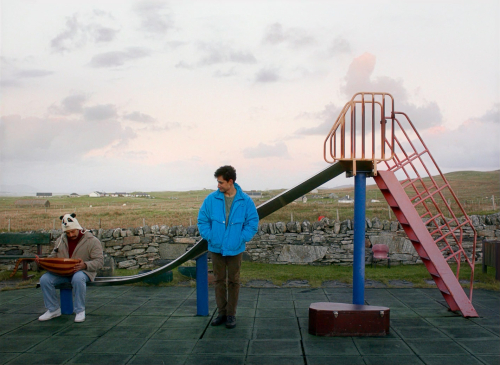
The BFI London Film Festival
MOVIE REVIEW
Limbo (2020)
The strange new world these men find themselves in is strange by design, and they all know it. The four main characters – Omar (Amir El-Masry), Farhad (Vikash Bhai) and brothers Wasef (Ola Orebiyi) and Abedi (Kwabena Ansah) – are sharing a house in a remote part of a remote Scottish island while they wait in the titular limbo for their asylum claims to be assessed. Until they are, they are forbidden to work and given only a very small amount of money with which to stay alive. Unsurprisingly, time hangs heavy on their hands, despite the spectacular beauty of the place. The thrice-weekly arrival of the postman is a major event. It’s an attempt to break them of course, to make them lose heart and volunteer to be returned to from whence they came. Of course, none of them really have homes to return to. And as Abedi observes to Omar, they have already been to hell.
All their experiences on the island are just plain bewildering, and Omar more or less permanently maintains the poker face which is, in the circumstances, the only correct reaction. He brings everywhere – and that means everywhere – the oud (a stringed instrument) that is the only possession he carried out of Syria, but he will not even consider playing it. The oud sits on the ground next to him as he attends classes designed to help the asylum seekers integrate into British society. Of course, most of them speak decent English already, taught through movies, Queen albums and bootleg “Friends” DVDs. It’s difficult to see how the exercises in telephone interviews acted out by Helga (Sidse Babett Knudsen, the lead actress from the Danish series “Borgen” which has been a huge hit in Britain, working in English) and her partner Boris (Kenneth Collard) will help. The idea seems to be that it’s better than nothing. But the dance sequence which opens the film, of Helga and Boris silently dance-flirting in front of a chalkboard to a Hot Chocolate song while the class watches in polite gobsmacked disgust, sets the tone. That is, crazed laughter being the only proper response, but because the laughter is not socially acceptable in these circumstances, blank acquiescence is the best option.
Of course, if they didn’t laugh, they’d cry. As the film unfolds, writer-director Ben Sharrock masterfully sets out the experiences of the four men, both back home and on the island. They are all decent guys, looking out for each other and trying hard to make their awful situation bearable for each other. Wasef is stubbornly clinging to the dream of professional football, while Abedi is going to make the best of things as a cleaner and can’t understand why Wasef won’t also buckle down. Farhad is the most optimistic of the four, forever producing ridiculous new treasures from donation boxes, stealing a chicken for a pet and naming him Freddie Mercury, or announcing himself as Omar’s agent-manager over Omar’s objections. Mr. Bhai manages to convey Farhad’s hopeless optimism through weary body language; here is someone who refuses to give up despite ceaseless cruelty, and if that means wearing a child’s hat or playing with a ping-pong paddle, then he’ll do it with all the panache he can muster.
But Omar is the hero and Mr. El-Masry is an actor up there with the greats of silent cinema, able to convey huge emotion with the merest twitch of his facial muscles. There’s a lone phone box near the refugee center – “I had better phone signal in the middle of the Mediterranean” someone accurately points out early on – from which Omar tries to stay in touch with his parents. All three of them fret about Omar’s older brother Nabil, who has been missing for a while on the frontlines of the war. Nabil’s absence is as much with Omar as his oud. He passes the time walking the island, having discomfiting encounters with the locals – who aren’t hostile, exactly, but not exactly friendly either. Early on a car full of teenagers pulls up alongside Omar to check whether he’s a terrorist and casually threaten him. But then they realize a storm is coming, and insist not only on giving Omar a lift home, but also on doing doughnuts on the beach with him in the car to cheer him up. It’s no wonder Omar hides behind his poker face.
But as time wears on everyone’s resolve begins to crack. The police undertake a few raids, and some of their friends are taken away. Nick Cooke’s cinematography does a sharply understated job of emphasizing mood. For the most part the camera is still, a passive onlooker. Sometimes it turns to the left, or the right, as humans do when turning their heads. When Omar is in the local shop the camera pans the shelves with him. But Omar walks down the road the camera does not follow, allowing the Shetlands’ wildly beautiful scenery to do the work. But then there’s a bad snowstorm, which includes a moment of rank horror, all the more horrendous because Omar reacts in total silence. The camera moves differently here in emphasis.
As Omar reels from the snowstorm’s events, the news that his parents are seriously considering a return to Syria ratchets the pressure further. And what the movie does in reaction to this is one of the most emotionally powerful endings British cinema has given us in a very long time. The way in which the different strands of the film are brought together is a knockout. Despite the cinematic strength and emotional intelligence of everything that’s come before, the cathartic force of “Limbo’s” ending is completely unexpected. It’s a marriage of the wild location, Farhad’s treasures, brotherly love, the inescapable specter of death, Jelly Babies, and Mr. El-Masry’s astounding face. I cried so hard I got a nosebleed, which has never happened to me before.
Comments